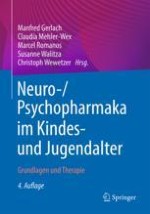Zusammenfassung
Die Zielsymptome einer Pharmakotherapie der kindlichen und jugendlichen Depression umfassen die niedergeschlagene Stimmung bzw. Gereiztheit, psychomotorische Hemmung, Grübelgedanken, somatische Beschwerden und mögliche wahnhafte depressive Symptome. Neben Störungen von Appetit, Schlaf- Wach-Rhythmus und bei älteren Jugendlichen Beeinträchtigungen der Libido sind suizidale Gedanken und Handlungen wichtige Zielsymptome einer antidepressiven Medikation. Aufgrund der nachgewiesenen therapeutischen Wirksamkeit und Verträglichkeit stellen selektive Serotonin-Wiederaufnahmehemmer (SSRIs) Antidepressiva der ersten und zweiten Wahl für die Behandlung depressiver Störungen im Kindes- und Jugendalter dar. Fluoxetin ist das Antidepressivum der ersten Wahl, Escitalopram und Sertralin sind zweite Wahl. Bei gleichzeitig vorhandenen akut behandlungsbedürftigen Angstsymptomen oder emotionaler Gespanntheit kann eine Kombinationsbehandlung mit Benzodiazepinen, bei ausgeprägten Schlafstörungen oder Agitation die gleichzeitige Gabe von sedierenden Antidepressiva, Melatonin oder in seltenen Fällen niederpotenten Antipsychotika notwendig werden. Im folgenden Kapitel werden Rahmenbedingungen einer antidepressiven Pharmakotherapie und Behandlungsstrategien vorgestellt sowie klinisch relevante Informationen zum Einsatz der Wirkstoffe erster und zweiter Wahl sowie anderer Antidepressiva gegeben. Das Kapitel schließt mit möglichen Maßnahmen bei Non-Response und Empfehlungen zu Therapiedauer und Phasenprophylaxe.











